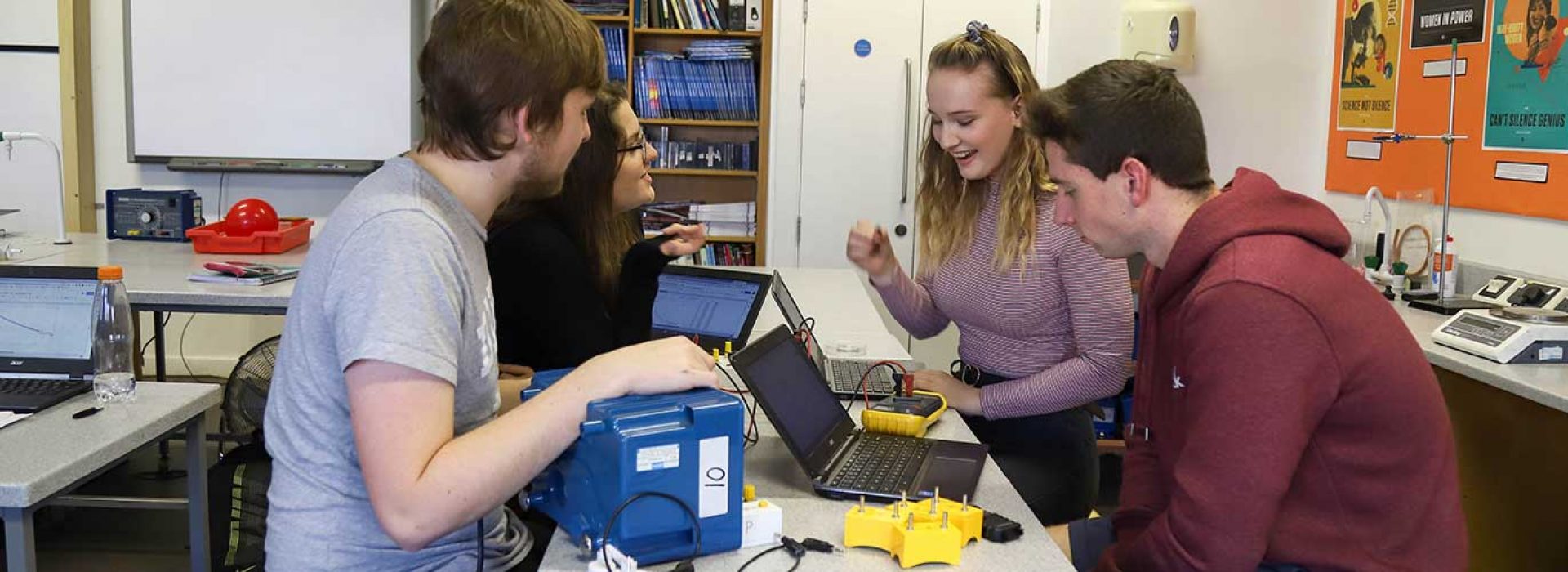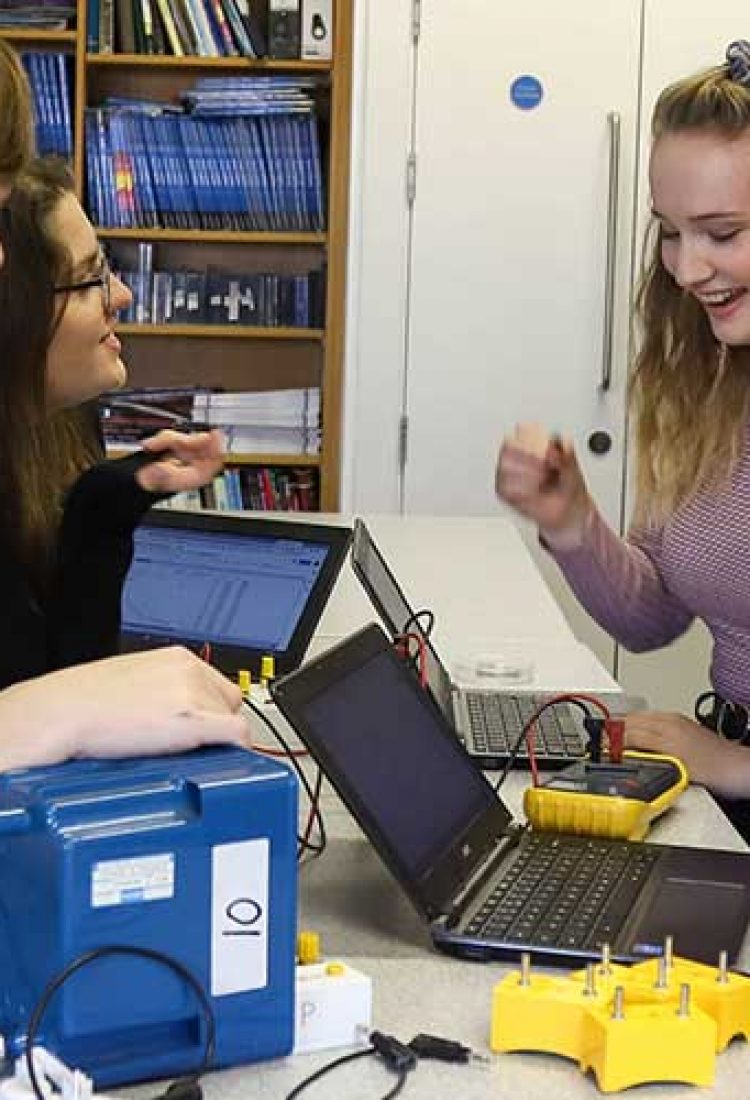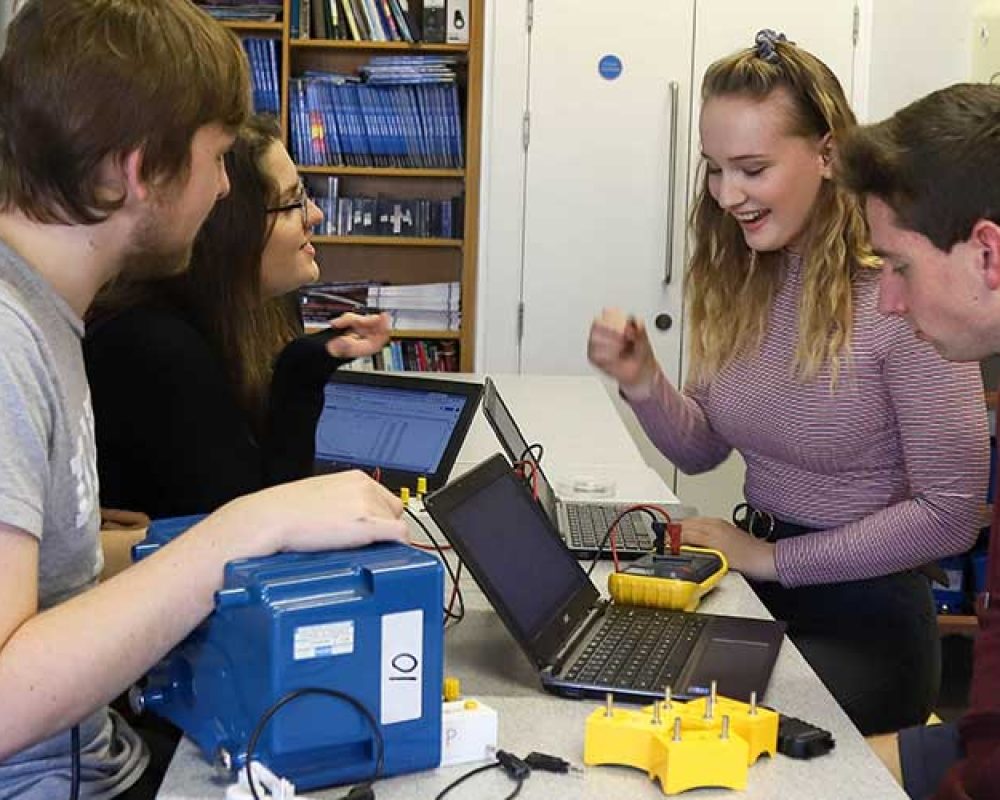Entry Requirements
Combined Science – Grade 6/7 or Physics – Grade 7, Mathematics – Grade 7
Examination Board: OCR A – H556
Introduction/General Advice and Requirements
Are you:
- Curious about how things work?
- Keen to solve both theoretical and practical problems?
- Good at maths?
- Do you: Enjoy a challenge?
- Want to contribute positively to an increasingly technological society?
- Value keeping your career options open?
Physics is arguably the most exciting and intellectually stimulating of the natural sciences. It is also the most basic, and underpins other sciences and engineering. Topics in physics range from the quantum world of subatomic particles to the formation and destiny of the universe. Between these extremes are the studies of nuclei, atoms and the materials that make up the world in which we live.
In the process of discovery physicists have developed quantum mechanics, relativity, thermodynamics and a detailed knowledge of the forces between particles. Advances in physics are responsible for many of the benefits of modern society. For example, semiconductor physics has transformed communication and computational technology, X-rays and nuclear magnetic resonance are indispensable in health care, and lasers are employed in a variety of useful ways from medicine to machinery. Physics has a continuing, vital role to play in developing alternative energy sources.
The course is designed to be a progression from GCSE Science: Double Award, or from GCSE Physics courses. It is expected that all students starting the course will have obtained Grade 6/7 or better in Double Award Science or a Grade 7 in Physics. The nature of Physics is such that students need to be competent in Mathematics. It is not necessary to be studying A level Mathematics (although these students will find themselves at an advantage) but we require students to have obtained Grade 7 or better in GCSE Mathematics. Students who feel they may struggle with these requirements should discuss this with the Head of Department as special conditions may apply in the light of changes of both GCSE and A level specifications.
Note that students intending to take physics or engineering courses at University will probably need to study A level mathematics.
Course Content & Assessment
The aims of the A level Physics courses are to encourage candidates to:
- develop their interest in, and enthusiasm for Physics, including developing an interest in further study and careers in Physics
- appreciate how society makes decisions about scientific issues and how the sciences contribute to the success of the economy and society
- develop and demonstrate a deeper appreciation of the skills, knowledge and understanding of How science works;
- develop essential knowledge and understanding of different areas of Physics and how they relate to each other.
There is no coursework but students who complete the entire A level will have the opportunity of obtaining a practical endorsement. The A Level is assessed by 4 examinations.
Module 1: Development of practical skills in physics
Practical skills assessed in a written examination and in the practical endorsement
Module 2: Foundations of physics
Physical quantities and units, Making measurements and analysing data, Nature of quantities
Module 3: Forces and Motion
- Motion – Kinematics, Linear motion, projectile motion
- Forces in action – Dynamics, Nonlinear motion, Equilibrium, Density and pressure
- Work and energy – Work and conservation of energy, Kinetic and potential energies
- Materials – Behaviour of springs and materials
- Newton’s laws and momentum – Collisions
Module 4: Electrons, Waves and Photons
- Electric current – Charge, Mean drift velocity
- Energy, power and resistance – Circuit symbols, E.m.f. and p.d.,Resistance, Resistivity, Power
- Electrical circuits – Series and parallel circuits, Practical circuits, internal resistance, potential dividers
- Waves – Wave motion, Electromagnetic waves, Superposition, Stationary waves
- Quantum physics – Energy of a photon, The photoelectric effect, Wave-particle duality
Module 5: Newtonian world and astrophysics
- Thermal Physics – Solid, liquid and gas, Temperature, Thermal properties of materials, Ideal gases
- Circular motion – Circular motion, Centripetal force
- Oscillations – Simple harmonic oscillations, Damping
- Gravitational Fields – Masses, Newton’s law of gravitation, planetary motion, gravitational and
- potential energy
- Astrophysics and cosmology – Stars, Electromagnetic radiation from stars
Module 6: Particles and medical physics
- Capacitors and exponential decay – Capacitors, Energy
- Electric and magnetic fields – Electric fields, Magnetic fields, Electromagnetism, Motion of charged particles
- Nuclear and particle physics – The nuclear atom, Fundamental particles, Radioactivity, Nuclear fission and fusion
- Medical imaging – X-rays, Diagnostic methods in medicine, Ultrasound
CAREER OPPORTUNITIES
Your future matters. So, if you have an enquiring mind, enjoy a challenge and like solving problems, give yourself the best chance by studying physics – the subject of the future. From the smallest part of the human body to the great clusters of galaxies, physics helps us understand how our world works. The applications, like the career opportunities, are infinite. Employers today actively seek out people who can prove their ability to think logically, understand complex ideas and apply them to the real world. Whether you want to pursue a career in science, the media, education, business or a host of other fields, physics can help give you the edge.


